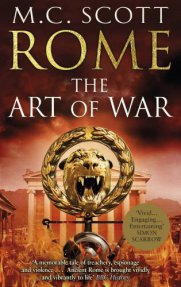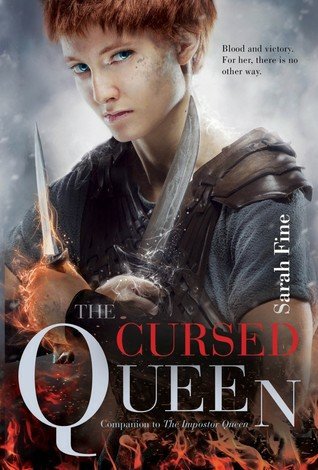

★★★½
The Rome Novels: Book IV
You certainly can’t accuse Manda Scott of doing the same thing over and over again. The first two novels of this series were written in the third-person; the third was in the first person; and this book is knitted together from an interweaving series of first-person testimonies from a dizzying number of characters. Nor do we remain in Judea, where I was just getting settled in. Instead, we’re whisked back to Rome for the final showdown in the Year of the Four Emperors, as the anxious Vitellius clings to power on the Palatine, and Pantera attempts to smooth the ground for his chosen candidate Vespasian to take the throne. But forces are at work against Pantera, led by an enemy as cunning and ruthless as himself. More to the point, someone in his inner circle is betraying him…
Pantera returns to Rome in the late summer of 69 AD, bound by an oath to Vespasian to protect the three people the future emperor loves best: his brother, Sabinus; his younger son, Domitian; and his mistress Caenis. He enters a city rippling with tension. Vitellius is the third emperor to have taken power since the death of Nero a year before, and he’s a nervous, vacillating man, devoid of either the charisma or the cruelty to rule. Guided by his uncompromising younger brother Lucius – who everyone knows to be the power behind the throne – Vitellius flounders unhappily. Rome is ripe for Vespasian’s taking, but Lucius isn’t about to let it go without a fight. He presents the new members of Vitellius’ Praetorian Guard with one lead tablet each: every tablet bears the name of an enemy of the state who must die. One of the most brilliant young soldiers, Juvens, draws the name of the popular former commander and Guard Trabo. Another gifted soldier, Geminus, draws the name of Pantera himself. The game is on.
This book was easily the most overwhelming of the four, not just because of the amount of action packed into its 582 pages, but also due to the effort of concentration demanded on the part of the reader. The characters we’ve taken the time to get to know over the course of the last three books, from Mergus to Kleopatra and Demalion, are absent here, acknowledged only by name-checks or as very brief cameos. I missed them. Instead, we have to get to know a whole new raft of people: the Praetorian Geminus, who is loyal to Vitellius; the former soldier and Praetorian Trabo, an adherent of the dead would-be emperor Otho; Jocasta, the sister of the poet Statius and the new commander of Seneca’s spy network; Vespasian’s Greek mistress Caenis; her freedman Matthias; the brothel-owner Horus; Borros, a slave of British ancestry; and a whole host of small street-boys universally called Marcus.
That’s at least eight different points of view and, although there are some differences between the narrative style (the soldiers tend to swear, Caenis is a little more refined), it isn’t always easy to remember who’s speaking at any given time. This made me realise that the characters aren’t at the core of Scott’s story (unless we’re speaking of Pantera himself, on whom more shortly). Instead, she’s telling the historical story and taking on the characters, book by book, who are best able to relate the next part of that story.
Scott gives us a lot of information about Pantera in this volume, having kept his past rather vague in the earlier books. Some of what we learn seems to contradict earlier information. For example, I thought Pantera had grown up in Jerusalem until his early teens, when he became ashamed of his father and left; and that he encountered Seneca soon afterwards somewhat in the Levant or Egypt, and was sucked into his network that way. (Mind you, it’s been a long time since I read the earlier books and I may have got that wrong.) Now it seems that he grew up among the silver-boys, the street children of Rome, and that he consequently has their slang and whistles down pat, and has them all in his pay. I’m a bit puzzled. More and more, in this volume, Pantera comes across as Lymond on steroids, which is no bad thing, but does begin to test the limits of belief about a man’s ability to disguise himself, escape villains and maintain a network of loyal adherents who are ready to hide him, dye his hair or feed him information. This book is, openly and unashamedly, an action-adventure spy thriller, and that’s fine, but it does mean that the emotional subtlety and depth which I admired so much in Scott’s Boudica novels and in her first couple of Rome books has been sacrificed on the altar of Drama.
I don’t know whether this is the last Rome book or not. The fact it was published in 2012, and that Scott has shown no signs of writing another since, would seem to indicate that is so. But the ending of the novel doesn’t feel like the end of a series. It feels a bit rushed – I would expect some time to say goodbye properly to the characters if it really was a permanent farewell – and there is definitely an opening for the story to be taken on, perhaps in a different direction. And I want to know what’s happening in Judea. I know there’s more to be told there: what of Titus’ romance with Berenice of Judea? What of his taking of Jerusalem? And, within the world of the story, what will happen to Mergus and Demalion when Vespasian becomes emperor? I hope this isn’t it… Scott has brought to life a period of history that I really didn’t care for much beforehand, and I would love to know more about the Roman encounters on their south-eastern frontier with Judea and Parthia and Egypt.
Am I disappointed with this (potentially) final book in the series? Well, a little. It’s darn good fun and a fast-paced thriller, but I’ve come to expect a little more from Manda Scott than that. I also felt that Pantera was on the brink of becoming the kind of hero who has a cunning plan laid to evade every trap, a sort of matinee-idol Robin-Hood type, for whom we never really fear because we know no harm can come to him. (I say ‘on the brink’ to avoid spoilers, because of course things can change.) Hmm. Great historical fiction, certainly, but it lacks the haunting power and grace of Scott’s best books.
To fill the Pantera-shaped hole in my life, I have some other ancient Roman historical fiction lined up to read, so we’ll be heading back to the legions very soon – albeit in a slightly different time period, courtesy of Douglas Jackson and Harry Sidebottom.
Buy the book
Last in the series – Rome: The Eagle of the Twelfth
Share this:





